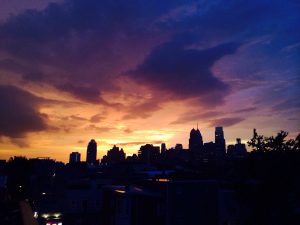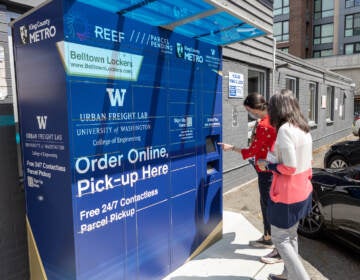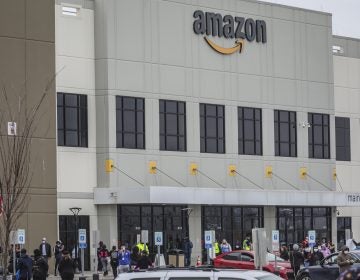Is Amazon too big for Philly’s kiddie-sized tech talent pool?
Philadelphia’s tech sector has been growing slowly, but steadily over the years. Is it big enough to attract the hulking online retailer?
Listen 4:41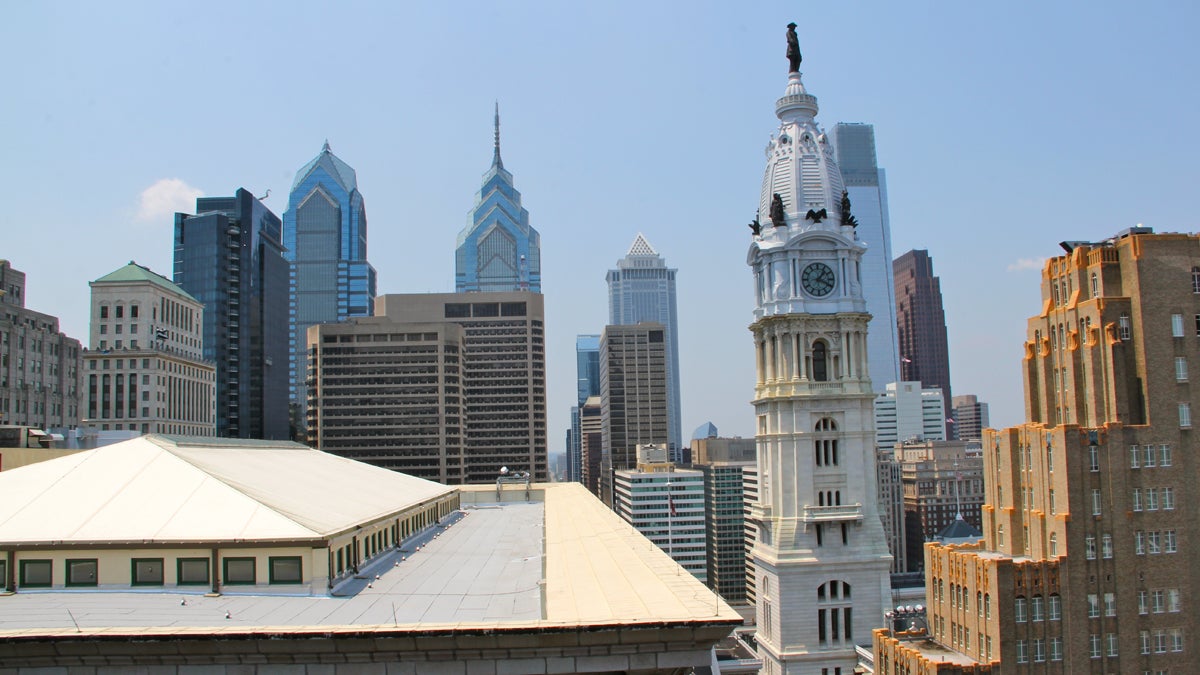
City Hall and the Center City skyline looking west from the roof of 1234 Market St. (Emma Lee/WHYY)
Like nearly every other city in North America, Philadelphia is putting the final touches on its bid to convince Amazon to build its second headquarters here ahead of Thursday’s deadline. The tech giant is making big promises to the winner: a $5 billion dollar investment and 50,000 high-paying jobs. In a series this week, PlanPhilly is using Amazon’s request for proposals (RFP) as a lens to examine the costs and benefits of doing business in our region.
Today: Amazon’s decision will likely come down to one question: Where can it find the smartest workforce for the best price? Philadelphia’s tech sector has been growing slowly, but steadily over the years, but is it big enough to attract the hulking online retailer?
If you’ve ever talked to a web developer or software engineer in Philadelphia about their work, you might have noticed they tend to use a somewhat peculiar word to describe their industry: community.
No other industry really bandies about that word with such frequency or sincerity as the tech and startup sector in Philly. While you may hear someone refer to the “legal community,” or the “medical community,” there the term is merely hackneyed shorthand for “almost all lawyers” or “the majority of doctors.”
But that’s not what “community” means among the would-be Bezoses in Philly. It’s used earnestly, the way most people would refer to their neighbors or how campus tour guides talk about their small liberal arts school.
Melissa Schipke, the CEO of Tassl, gushed about the help she got from other entrepreneurs.
“It was amazing the amount of people that were willing to support [me] along the way,” she said. “Now that I’m part of that community, it’s very clear how strong it is and the support we have for each other.”
“I do think our community is very collaborative, very open and inviting. You get access to just about anyone you want access to,” said Bob Moul, a successful serial entrepreneur and board member of Philly Startup Leaders, an entrepreneurial network. “Everybody will lend a hand.”
“The one thing I’ve heard, other cities’ tech scene is cutthroat and here, we’re collaborative,” said Chris Alfano, Chief Technology Officer for Jarvus Innovations and an organizer with Code for Philly.
Now, that may all be a bit of clever marketing, or studied sanguinity, among the sector’s biggest boosters. Earlier this month, Philly Startup Leaders’ executive director of resigned after a panel on diversity in Philadelphia’s tech sector ended in divisive remarks and tears.
The city’s startup CEOs have reason to stick to the party line and espouse the collaborative nature of their nominally competitive sector. Philadelphia’s startup scene is small in absolute terms: In 2015, venture capitalists invested $622 million in the region, a tenth of what Boston area startups saw and a tiny fraction of the $27.4 billion in Silicon Valley.
Philadelphia’s wealthier investors don’t share the same affinity for risky startup ventures their peers in New York City, Boston, or San Francisco do. While Silicon Valley investors are tossing hundreds of millions at concepts like a $400 “smart” juicer, Philadelphia’s entrepreneurs scrape by. Often, promising companies leave to find early investors; Warby Parker and Venmo both decamped to New York soon after their Philadelphia foundings.
To grow, the city’s startup scene needs to win the attention of outside angel investors and venture capital firms. And to do so, Philly needs to produce more big, bright success stories.
“There is much amazing stuff going on in tech here in Philly,” said Schipke. “Until we have somebody that makes a big exit or we get a company like [Amazon] here, Philadelphia gets passed up on being seen as the amazing tech community that is really is.”
That’s one of the reasons why the tech community seems uniformly in favor of Philadelphia’s bid to win Amazon’s HQ2 sweepstakes. Amazon would be the ultimate validation of their community.
Attracting an online leviathan to a tech lilliput
According to the Economy League of Greater Philadelphia, Philadelphia’s tech sector is one of the fastest-growing in the nation, responsible for 25 percent of the region’s job growth in recent years.
But the region’s overall job growth over the same period has been anemic, and the Economy League’s definition of tech jobs is expansive, including everyone from software developers at internet-based companies, to IT support technicians at local colleges to medical record technicians at area hospitals.
Babies will double their birth weight before they turn one, but that doesn’t make them big. Weighing in around 102,000 IT jobs, Philadelphia’s tech scene is still in its infancy.
Amazon wants to hire 50,000 employees and even though many will be managers, lawyers, accountants and support staff, it’s a safe bet most will be programmers and developers. There aren’t even enough tech workers now for the companies already here, recruiters say, even though the talent pool has grown 34 percent since 2002.
“There is all this opportunity, but yet it lacks the talent because there’s not enough people,” said Mark Constan, director of recruiting at the Meet Group.
His firm is based in New Hope, Pa. and is aggressively expanding its offices in Philly because there are more engineers downtown. “You need to have a presence in the city to open up the doors of the volume of tech talent that you need,” said Constan.
But even with the satellite office, Constan’s having trouble finding enough high-quality candidates.
Philly’s tech pool is still a small pond, and the big fish here — the companies — are constantly fighting to gobble up talented programmers.
To be fair, Constan and other recruiters all note that Philadelphia’s current tech talent crunch isn’t special. The Economy League’s report found that cities all over suffered for want of more tech talent. “Philadelphia is not unique in this respect whatsoever,” said Josh Sevin, the Economy League’s acting executive director.
Still, what everyone we spoke to seemed to agree on was that Philly needs a real big fish, a whale of a company, to lure in more tech talent. A company like Amazon.
“I’m excited about it. I think we need more anchor tech employers to attract and retain talent in the city,” said Alfano. “In Code for Philly, I see a lot of university students coming through from Drexel, from UPenn and Temple, and a lot of times they’re leaving Philly right after they graduate because they want to go to Seattle, they want go to the Bay, they want to go where the Amazons and Googles and Microsofts are.”
Alfano, like many of his colleagues, is a college-educated millennial. Millennials represent Philly’s fastest-growing age group. Since 2006, the percentage of the city’s population between 20-34 rose 6.1 percent, faster than millennial gains in other major cities. In other words, Philly’s overall population growth is being driven in large part by young folks (immigrants, many of whom are also millennials, are the other major factor).
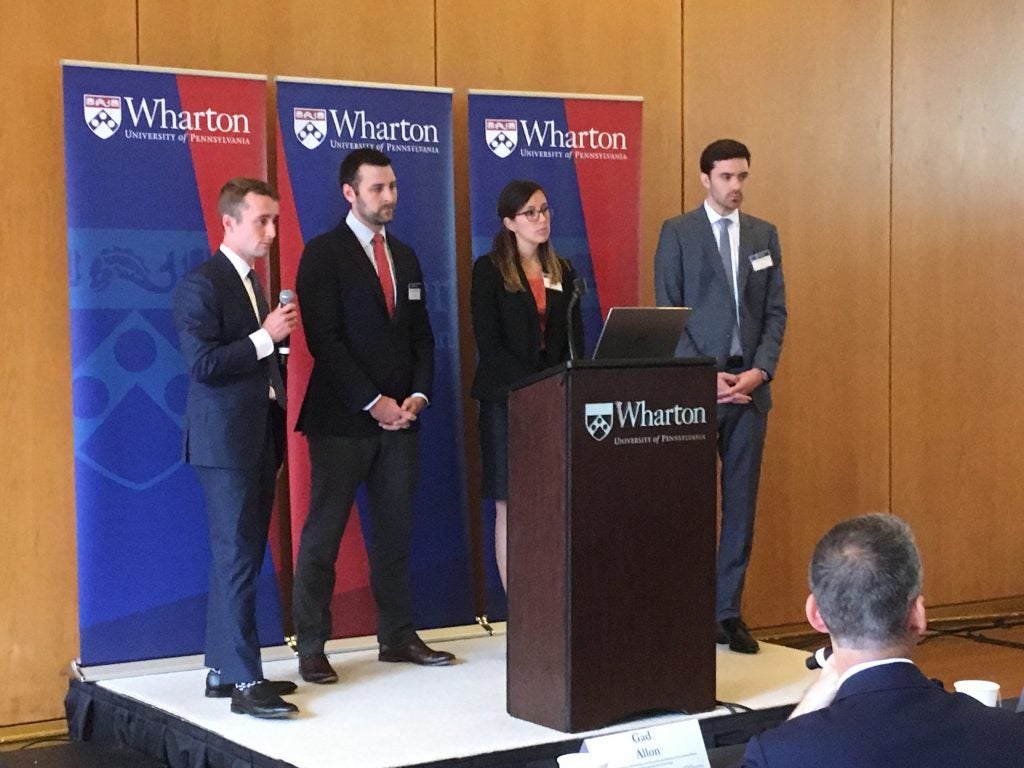
And they, in turn, are making the city a better-educated place. Just 27.4 percent of adult city residents have a college degree (and 36 percent in the region), a few points below the national average of 30 percent. But among city residents ages 25-34, that number jumps to 41.3 percent, more than seven points higher than the national average. But still, especially in the tech scene, many of the STEM students from the region’s 102 colleges and universities leave upon graduation to find work elsewhere.
So, we have a high-tech version of the chicken and the egg. Big tech companies like Amazon might not come here because we don’t have enough nerdy workers to fill their cubicles. And those nerdy workers don’t stick around Philly because we don’t have enough big companies for them to grow into.
If Amazon built its second headquarters here, that dynamic would change. As chief of staff at the Commerce Department, Sylvie Gallier Howard is one of the lead architects of Philly’s HQ2 bid. She says Amazon wouldn’t have to worry about the city’s relatively shallow talent pool for too long.
“We should think beyond just the Philadelphia region for these jobs. I mean people will move here from New York, they’ll move here from [Washington] D.C.,” said Howard. “A lot of people have been relocating from those areas because of our cost of living.”
A few thousand New Yorkers a year give up the Big Apple for the City of Brotherly Love, often citing Philly’s relatively affordable quality of life as a primary driver for moving down the Jersey Turnpike.
Amazon also proposes to ramp up to 50,000 over 15 years, not all at once, which suggests the company could fill its new headquarters with students graduating from local colleges.
Still, even with an tech talent influx from outside the Delaware Valley and local graduates to draw upon, Amazon’s second headquarters would be a sumo wrestler’s belly flop in Philly’s tech talent kiddy pool.
“In the short term, I’m kind of worried about it because it’ll make it tough for me as a tech employer to compete with the salaries they’re offering,” said Alfano.
“We definitely would feel feel the pressures and pings of losing people to a company like that,” said Meet Group’s Constan.
But, in the long run, it’ll be worth it, the startup leaders say.
“It’ll spawn a lot more startups,” said Alfano.
“There will be more people for a company like us to pull from,” said Constan.
If Amazon came to Philly, it might allow more aspiring executives like Tiffany Chang a chance to stay. Like most other juniors at the University of Pennsylvania’s Wharton School, Chang has begun her post-grad job search. She doesn’t know where she’ll end up next year — she says she’ll relocate pretty much anywhere for the right position. But she wouldn’t mind staying.
“I actually like Philly, it’s been really great,” said Chang. “It’d be amazing to stay here.”
Chang was a finalist in a pitch competition at Wharton that asked students to sell Amazon on Philly. Her team focused on the city’s millennial-drawing power and growing tech talent pool. Her research convinced her Philly would be a good HQ2 pick.
Chang’s team didn’t win the pitch contest. But if Amazon moves here and starts hiring Ivy Leaugers like her, maybe Chang — and Philadelphia — will win out, in the end.
WHYY is your source for fact-based, in-depth journalism and information. As a nonprofit organization, we rely on financial support from readers like you. Please give today.




